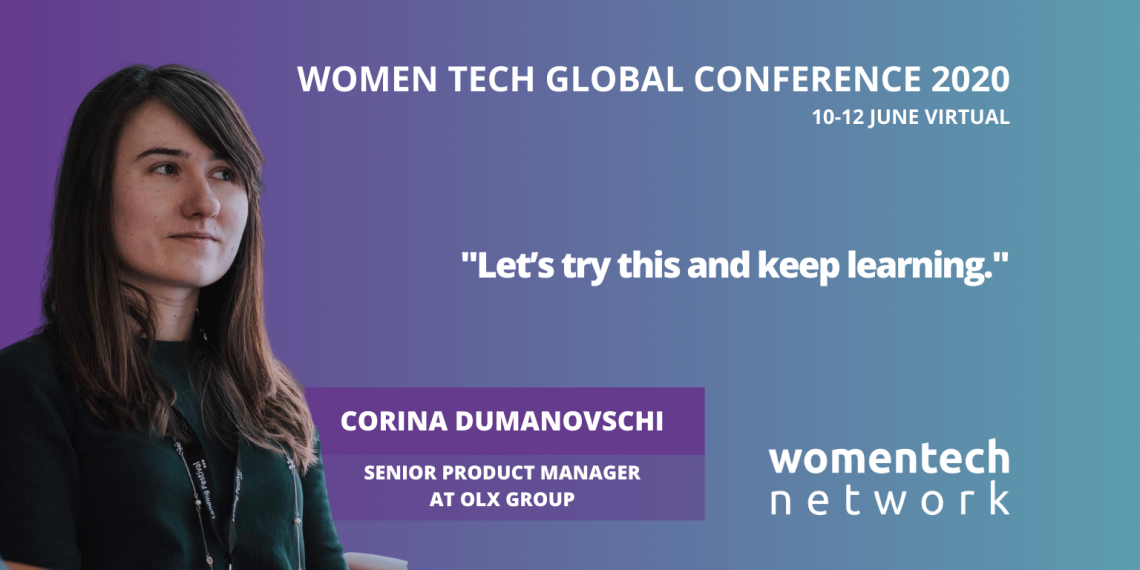
Corina Dumanovschi is a Senior Product Manager at OLX Group and an organizer of Women Techmakers Berlin. When she’s not solving problems and building products that people love and trust, she is advocating for education, diversity & inclusion. She has a degree in Computer Science Engineering and has worked across different industries ranging from e-commerce and insurance tech to classifieds marketplaces.
Especially for the WomenTech Network, Corina agreed to give an interview to one of our Global Ambassadors, Komal Khetlani.
“Q&A”
-
You started your career as a Software Engineer, and then how did you transition toward Product Management?
Moving into Product Management was more by accident to me. I was working in a start-up, where I ended up doing a lot of stuff - not just engineering, but also managing things end-to-end. I started reading more about it and started getting good at it. I met my mentor right after this time who had a similar journey of moving from software engineering to product management. She guided me in this journey.
So, in a nutshell, if you are passionate about product management and ready to go an extra mile to learn stuff, you will be able to make that transition.
-
How does the mindset of a Software Engineer differ from that of a Product Manager?
It depends on a lot of factors. As a software engineer, you are given a problem in hand, to solve. You then build software to solve it. While as a product manager, you have to find the problem. You have to be constantly open for new ideas and should be able to prioritize them on the basis of what value it’s going to create, the cost it brings along, the demand it has.
You have to understand the demands, needs and problems of your users. You are accountable for the product’s success or failure.
-
What steps should a person follow to move towards product management?
Experience is something which matters a lot. So, if you get a chance to shadow someone who is currently in a Product Management role, that would be great. Product people have a lot on their hands, so try picking up some tasks from them. Learn how they deal with various stakeholders and how they are making decisions. Listen to various podcasts online and read some resources which will be a good starting point.
-
What is the biggest challenge you face on your job as a Product Manager?
A day in the life of a product manager involves meeting and talking to a lot of people. You get to deal with the engineering team, internal and external stakeholders. There is a lot of diversity in terms of the kind of people you meet which makes it very exciting and challenging at the same time.
You have to translate this diversity into something inclusive which everyone ultimately buys into or commits to support. You have to deal with emotions. Dealing with just data and facts is not enough.
-
How do you identify and differentiate between a good idea and a not so good one?
It can be done by understanding the impact an idea is creating on users, by considering the value it creates, the cost incurred to implement the idea, risks and tradeoffs. Once I have a potential idea in hand, I use an opportunity tree which helps me assess the idea and reach the desired result.
-
How prevalent is gender bias in the Tech industry?
Let me take the example of Germany because I live here. The pay gap between men and women is approx. 21%. So, gender bias is prevalent to a great extent. And I feel, most women have felt some form of discrimination or the other. Unequal pay, diminished responsibilities, social pressure when it comes to family and housework are some ways in which gender bias can be seen. Not to mention how very few women we still have in tech, especially in leadership roles.
-
How can we combat gender bias at the workplace?
The very important thing about gender bias is to be aware of it. There are many women out there, who face gender bias daily but are unaware because that’s how things have been for them for years. There are people who are treating women differently due to unconscious biases. A very common gender bias which we face is not being given challenging tasks, which in turn questions our competency.
The only way to combat it is to speak about it. If you feel someone is being biased towards you, talk to that person and let them know that you are not comfortable with these types of recurring comments and gestures. Spread awareness as much as you can. Talk about it to your families, your kids. Form communities which work towards reducing the bias which is so deeply ingrained in our culture.
-
What advice would you give to a girl who has just started her career in the tech world?
It’s very important to document your achievements. Talk about your achievements loudly. Don’t hide them - it’s not bragging if it is based on facts. Try to keep some time aside to reflect on what you have learnt. What is important is to keep learning and keep growing. You will rise and shine, become more resilient.

You’re enjoying this interview thanks to our devoted Global Ambassador Komal Khetlani. She is a software developer by profession and passionate about growing women tech communities. In her free time, she loves to write articles on Medium and mentor juniors in driving their professional career.


